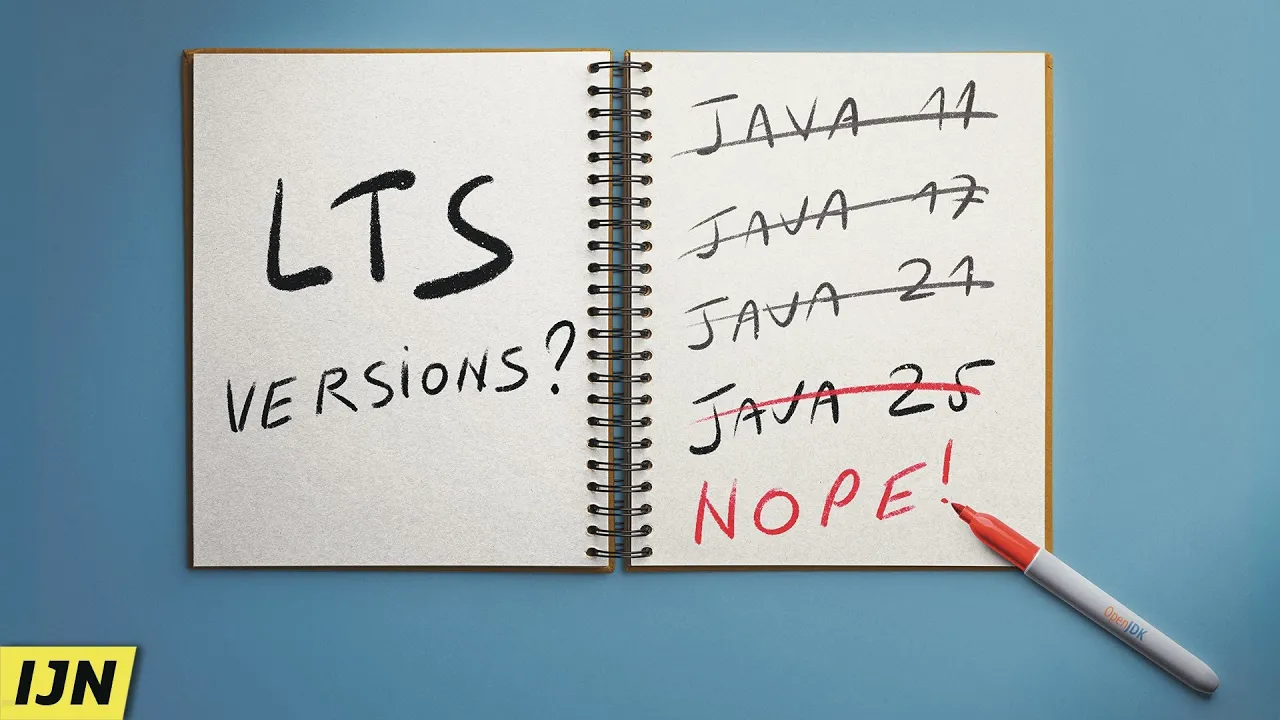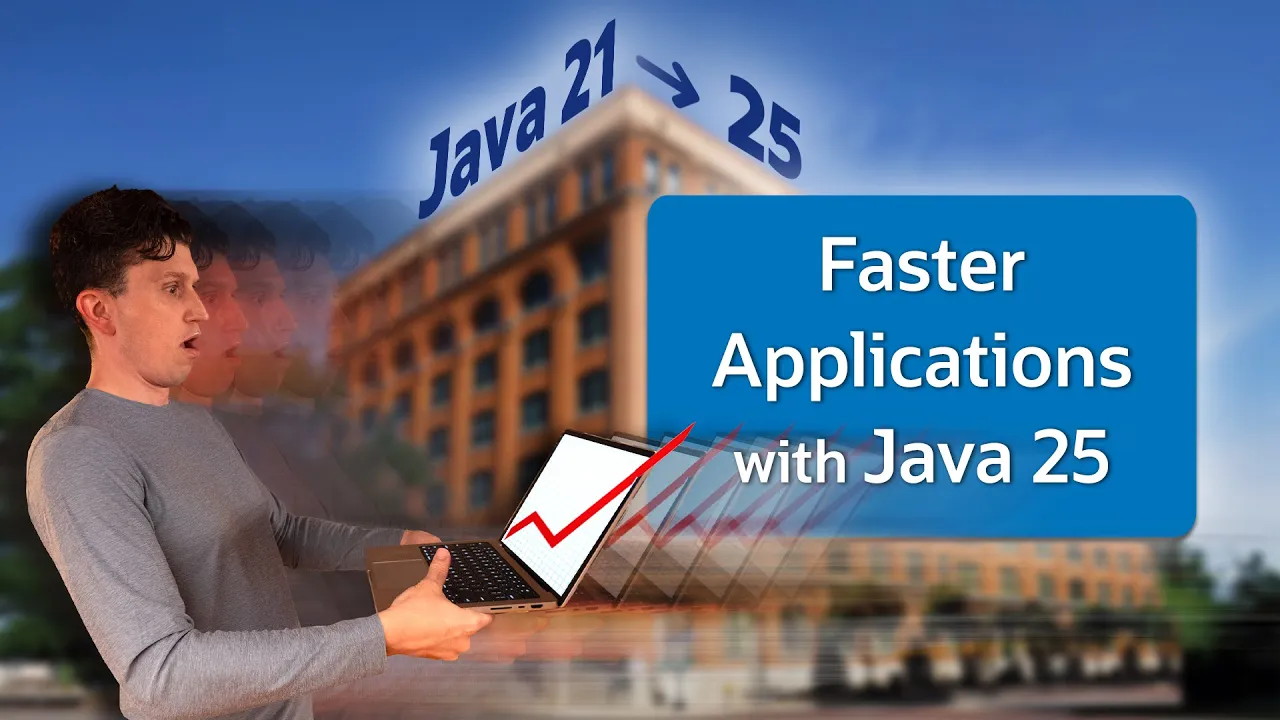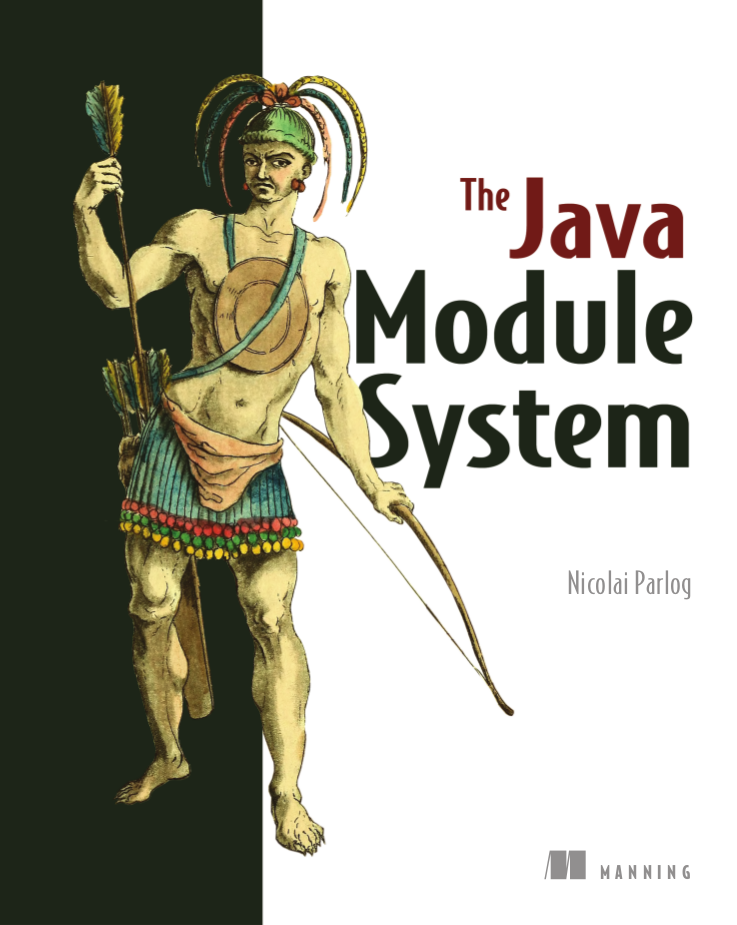// option A
import java.util.ArrayList;
import java.util.HashMap;
import java.util.List;
import java.util.Map;
// option B
import java.util.*;Java 25
Better Language, Better APIs, Better Runtime
Let’s get started!
JDK 25: jdk.java.net/25
this session is only on Java 25
(no time for 24, 23, 22)slides at slides.nipafx.dev/java-x
(hit "?" to get navigation help)ask questions any time
Java 25
| Final in Java 25 |
| Module Imports |
| Simplified Main |
| Flexible Constructor Bodies |
| Scoped Values |
| Ahead-of-Time Computation |
| Compact Object Headers |
| … |
Imports
Which one do you prefer?
Star Imports
Upsides:
more succinct
easier to manage manually
Downsides:
less clear
chance of conflicts
arbitrary slice of API
Module Imports
import module $mod;imports public API of
$modyour code does not need to be in a module
Module Import Details
import module $mod;Imports all public top-level types in:
packages exported by
$modpackages exported by
$modto your module
(qualified exports)packages exported by modules that
$mod
requires transitively (implied readability)
Module Imports
Upsides:
much more succinct
trivial to manage manually
Downsides:
less detailed
conflicts are more likely
Conflicts
import module java.base;
import module java.desktop;
import module java.sql;
public class Example {
public void example() {
// error: reference to Date is ambiguous
var outdated = new Date(1997, 1, 18);
// error: reference to List is ambiguous
var letters = List.of("I", "J", "N");
}
}Resolving Conflicts
import module java.base;
import module java.desktop;
import module java.sql;
import java.util.Date;
import java.util.List;
public class Example {
public void example() {
var outdated = new Date(1997, 1, 18);
var letters = List.of("I", "J", "N");
}
}Use Cases
Consider using module imports, when:
you’re already using star imports
you’re writing scripts, experiments, demos, etc.
Default Import
Compact source files implicitly import java.base:
// complete Main.java - no explicit imports!
void main() {
List<?> dates = Stream
.of(1, 2, 23, 29)
.map(BigDecimal::new)
.map(day -> LocalDate.of(
2024,
RandomGenerator.getDefault()
.nextInt(11) + 1,
day.intValue()))
.toList();
IO.println(dates);
}More
📝 JEP 511: Module Import Declarations
Java 25
| Final in Java 25 |
| Module Imports |
| Simplified Main |
| Flexible Constructor Bodies |
| Scoped Values |
| Ahead-of-Time Computation |
| Compact Object Headers |
| … |
A Mature Ecosystem
Java is very mature:
refined programming model
detailed toolchain
rich ecosystem
But this can make it hard to learn for new (Java) developers.
Approachable Java
Java needs to be approachable:
for kids
for students
for the frontend dev
for ML/AI folks
etc.
Java needs an on-ramp for new (Java) developers!
On-Ramp to Java
On-ramp:
simplified
mainmethod and classsingle-source-file execution
multi-source-file execution
Simpler Code
Remove requirement of:
String[] argsparametermainbeing staticmainbeing publicthe class itself
// smallest viable Main.java
void main() {
// ...
}Simpler Terminal Interaction
Use java.lang.IO instead of System.{in|out}:
void print(Object)&void println(Object)to writeString readln(String)to read input
void main() {
var name = IO.readln("Please enter your name: ");
IO.println("Nice to meet you, " + name);
}Simpler Imports
Compact source files implicitly import java.base:
// complete Main.java - no explicit imports!
void main() {
List<?> dates = Stream
.of(1, 2, 23, 29)
.map(BigDecimal::new)
.map(day -> LocalDate.of(
2024,
RandomGenerator.getDefault()
.nextInt(11) + 1,
day.intValue()))
.toList();
IO.println(dates);
}Single-File Execution
It’s easy to execute that file:
java Main.javaMulti-File Execution
The program can expand:
MyFirstJava
├─ Main.java
├─ Helper.java
└─ Lib
└─ library.jarRun with:
java -cp 'Lib/*' Main.javaProgression
Natural progression:
start with
main()need arguments? ⇝ add
String[] argsneed to organize code? ⇝ add methods
need shared state? ⇝ add fields
need more functionality? ⇝ explore JDK APIs
even more? ⇝ explore simple libraries
need more structure? ⇝ split into multiple files
even more ⇝ use visibility & packages & modules
Doesn’t even have to be that order!
More
Java 25
| Final in Java 25 |
| Module Imports |
| Simplified Main |
| Flexible Constructor Bodies |
| Scoped Values |
| Ahead-of-Time Computation |
| Compact Object Headers |
| … |
Constructor Chaining
With multiple constructors,
it’s good practice to have one constructor that:
checks all arguments
assigns all fields
Other constructors just forward (if possible).
Constructor Chaining
class Name {
private final String first, last;
Name(String first, String last) {
// [... checks, assignments, etc. ...]
}
Name(String fst, String mid, String lst) {
this(fst + " " + mid, lst);
}
}Forced Constructor Chaining
- Superclasses
To ensure superclass initialization, chaining
throughsuper(…)is enforced.- Records
To enforce a uniform construction protocol,
chaining throughthis(…)to the canonical
constructor is enforced.
Limitations
But:
superclass should be initialized
before subclass runs any code
⇝ no code beforesuper(…)code before
this(…)would
run beforesuper(…)
⇝ no code beforethis(…)
So: no statements before super(…) / this(…)!
Consequence
With:
class Aclass B extends Aclass C extends B
Effective constructor execution for new C():
Object ⇝ A ⇝ B ⇝ C
Irregularities
Name(String first, String last) {
this.first = first;
this.last = last;
IO.println(this);
}
ThreePartName(String fst, String mid, String lst) {
super(fst, lst);
this.middle = mid;
}
new ThreePartName("Jane", "Jennifer", "Doe");
// prints: "Jane null Doe" 😖Inconveniences
Limitation is inconvenient when you want to:
check arguments
prepare arguments
split/share arguments
Splitting Arguments
class Name {
private final String first, last;
Name(String first, String last) {
this.first = first;
this.last = last;
}
Name(String full) {
// less readable & does the same work twice
this(full.split(" ")[0], full.split(" ")[1]);
}
}Splitting Arguments
Workarounds exist, but what we want to write:
class Name {
// [... fields, constructor as before ...]
Name(String full) {
String[] names = full.split(" ");
this(names[0], names[1]);
}
}Flexible Constructor Bodies
Flexible constructor bodies allow just that!
Constructor(...) {
// prologue
// call to this(...) or super(...)
// epilogue
}Prologue:
can’t touch
thisexcept to assign fields
Consequence
With:
class Aclass B extends Aclass C extends B
Effective constructor execution for new C():
prologue C ⇝ prologue B ⇝ prologue A
⇝ Object ⇝
epilogue A ⇝ epilogue B ⇝ epilogue C
Prologue
Great to:
check arguments
prepare arguments
split/share arguments
assign fields (!)
Fully initializing state in the prologue
prevents escape of ill-formed instances.
Split Arguments
class ThreePartName extends Name {
private final String middle;
ThreePartName(String full) {
// split "first middle last" on space (once 🙌🏾)
var names = full.split(" ");
this.middle = names[1];
super(names[0], names[2]);
}
}Future Expansion
JEP 401 ("Value Classes and Objects") may make
constructor "prologue by default" for:
value classes
all records
Also "anticipates" that regular classes can opt in.
More
📝 JEP 513: Flexible Constructor Bodies
📝 JEP 401: Value Classes and Objects ⇝ Safe Construction
🎥 Valhalla - Where Are We? (Brian Goetz - Aug 2024)
Java 25
| Final in Java 25 |
| Module Imports |
| Simplified Main |
| Flexible Constructor Bodies |
| Scoped Values |
| Ahead-of-Time Computation |
| Compact Object Headers |
| … |
Passing Data
Method inputs are usually instance fields or arguments,
but sometimes:
arguments are sensitive or inconvenient
data is thread-specific
each thread needs to mutate its own instance
…
Common solution: ThreadLocal.
ThreadLocal Example
static final ThreadLocal<Integer> ANSWER =
new ThreadLocal<>();
void main() {
ANSWER.set(42);
IO.println(ANSWER.get()); // "42"
new Thread(() -> {
IO.println(ANSWER.get()); // "null"
}).start();
IO.println(ANSWER.get()); // "42"
}ThreadLocal Properties
Challenges when using ThreadLocal:
requires manual clean-up
data flow is two-way and possibly complex
inheriting data to child threads can be expensive
ScopedValue addresses all that.
ScopedValue Example
static final ScopedValue<Integer> ANSWER =
ScopedValue.newInstance();
void main() {
ScopedValue // ⬐ VALUE
.where(ANSWER, 42)
// |<---------- SCOPE ----------->|
.run(() -> IO.println(ANSWER.get())); // "42"
// OUT OF SCOPE
ANSWER.get(); // ⚡️ NoSuchElementException
}ScopedValue Properties
Central properties:
data is only available in
rundata flow is one-way
inheriting data to child threads is cheap
(becauseThreadLocalcan be mutated)
This comes at the cost of less flexible data flow.
Rebinding ScopedValue
A scoped value can be rebound for a nested scope:
static final ScopedValue<Integer> ANSWER =
ScopedValue.newInstance();
void a() {
ScopedValue
.where(ANSWER, 42)
.run(this::b);
}Rebinding ScopedValue
void b() {
IO.println(ANSWER.get()); // "42"
ScopedValue
.where(ANSWER, ANSWER.get() + 1)
.run(this::c);
IO.println(ANSWER.get()); // "42"
}
void c() {
IO.println(ANSWER.get()); // "43"
}Cheap Inheritance
Because scoped values are immutable
no copies are needed within a scope.
Structured concurrency is inherently scoped.
⇝ Tasks/threads of a StructuredTaskScope
inherit scoped values.
(Only this inheritance is possible.)
Scoped Inheritance
ScopedValue.where(ANSWER, 42).run(() -> {// scope ──┐
try (var scope = StructuredTaskScope // │
.open() { // │
// child threads' scope ──┐ │
var subA = scope.fork(ANSWER::get); // │ │
var subB = scope.fork(ANSWER::get); // │ │
// │ │
scope.join(); // │ │
// │ │
var result = subA.get()+subB.get(); // │ │
IO.println(result); // "84" // │ │
} // all child threads completed ──┘ │
IO.println(ANSWER.get()) // "42" // │
} // ─────┘More
📝 JEP 506: Scoped Values
Java 25
| Final in Java 25 |
| Module Imports |
| Simplified Main |
| Flexible Constructor Bodies |
| Scoped Values |
| Ahead-of-Time Computation |
| Compact Object Headers |
| … |
Java Performance
Java has really good peak performance,
but also tends to have:
slow startup time
slow warmup time
Startup & Warmup
Early work by the runtime:
class loading
callsite linkage
constant pool resolution
interpretation
profile gathering
JIT compilation (C1, C2)
Can we do this ahead of time?
Dynamic Java
But Java is highly dynamic:
class loading
class redefinition
linkage
access control
method dispatch
run-time typing (e.g. casting)
introspection
JIT compilation, decompilation
How to AOT everything?
Enter AOTCache
Project Leyden introduces AOTCache:
observe JVM
capture decisions in AOTCache
(expansion of CDS Archive)use as "initial state" during future run
fall back to live observation/optimization
if necessary and possible
AOT workflow
# training run (⇝ profile)
$ java -XX:AOTMode=record
-XX:AOTConfiguration=app.aotconf
-cp app.jar com.example.App ...
# assembly phase (profile ⇝ AOTCache)
$ java -XX:AOTMode=create
-XX:AOTConfiguration=app.aotconf
-XX:AOTCache=app.aot
-cp app.jar
# production run (AOTCache ⇝ performance)
$ java -XX:AOTCache=app.aot
-cp app.jar com.example.App ...AOT workflow
Shortcut for most cases:
# training run (⇝ AOTCache)
$ java -XX:AOTCacheOutput=app.aot
-cp app.jar com.example.App ...
# production run (AOTCache ⇝ performance)
$ java -XX:AOTCache=app.aot
-cp app.jar com.example.App ...AOT class loading & linking
Improve startup time by making the classes of an application instantly available, in a loaded and linked state, when the HotSpot JVM starts.
Spring PetClinic benchmarks:
up to ~40% startup time reduction
AOT cache size of ~130 MB
AOT method profiling
Improve warmup time by making method-execution profiles from a previous run of an application instantly available, when the HotSpot Java Virtual Machine starts.
Benchmark of a 100_000x loop over a simple stream:
~20% run time reduction
AOT cache size increased by ~2.5%
AOT limitations
Limitation so far:
same JDK release / architecture / OS
consistent class path for training and production
consistent module options
limited use of JVMTI agents
Otherwise, AOT cache is ignored.
Upcoming features
class data caching with any GC (JEP 516)
code compilation (JDK-833536)
More
📝 JEP 483: AOT Class Loading and Linking ㉔
📝 JEP 515: AOT Method Profiling ㉕
📝 JEP 514: AOT CLI Ergonomics ㉕
🎥 A Preview of What’s Coming in Project Leyden (Oct 2024)
Java 25
| Final in Java 25 |
| Module Imports |
| Simplified Main |
| Flexible Constructor Bodies |
| Scoped Values |
| Ahead-of-Time Computation |
| Compact Object Headers |
| … |
Object information
Runtime needs to track information per object:
garbage collection: forwarding pointers and object ages
type system: object’s class
locking: unlocked, light-weight, or heavy-weight locks
hashing: identity hash code, once computed
This is stored in the object header.
Object header
On 64bit hardware:
95-64 .........................HHHHHHH
63-32 HHHHHHHHHHHHHHHHHHHHHHHH.AAAA.TT
31- 0 CCCCCCCCCCCCCCCCCCCCCCCCCCCCCCCCA: GC ageC: class word (compressed)H: hash codeT: tag bits
Object Overhead
This incurs overhead:
objects tend to be small
(many workloads average 256-512 bits)header size is noticable
(15-30% on such workloads)
⇝ This is worth optimizing.
Complications
The aforementioned subsystems are
complicated and performance-sensitive.
I’ve only told you the easy part of object headers:
locking operations can override upper 62 bits.
Compressed headers
Project Lilliput achieved first milestone:
63-32 CCCCCCCCCCCCCCCCCCCCCCHHHHHHHHHH
31- 0 HHHHHHHHHHHHHHHHHHHHHVVVVAAAASTTA: GC ageC: class wordH: hash codeS: self-forwardingT: tag bitsV: Valhalla bits
Effects
These changes have several downstream effects:
locking operations no longer override
class word is now much smaller and encoded differently
GC forwarding operations become more complex
In special cases, these may be detrimental to performance.
Benchmarks
In one setting, the SPECjbb2015 benchmark uses 22% less heap space and 8% less CPU time.
In another setting, the number of garbage collections done by SPECjbb2015 is reduced by 15%, with both the G1 and Parallel collectors.
A highly parallel JSON parser benchmark runs in 10% less time.
Try it out!
Add flag:
-XX:+UseCompactObjectHeadersReport observations to hotspot-dev!
This is vital to:
improve performance, specifically edge cases
decide whether this becomes default/only header encoding
Note
Interaction with other features:
compressed class pointers must be enabled (default)
stack locking must be disabled (default)
More
Java 25
| Final in Java 25 |
| Module Imports |
| Simplified Main |
| Flexible Constructor Bodies |
| Scoped Values |
| Ahead-of-Time Computation |
| Compact Object Headers |
| … |
Smaller API Additions
Since Java 21:
Console:Localeoverloads for
format,printf,readLine,readPasswordConsole:isTerminalReader:readLines,readAllAsStringMath,StrictMath: more exact overloads,
e.g.unsignedMultiplyExact(int, int)Instant:until(Instant)ForkJoinPool:schedule…and moreBodyHandlers,BodySubscribers:limiting
Performance improvements
Every Java release improves performance, e.g.:
JDK 25 vs 8: +113%/+31% critical/max jOPS in SPECjbb 2015
JDK 25 vs 21: +10%/+5% critical/max jOPS in SPECjbb 2015
JDK 25 vs 21: +70-75% requests/s on Helidon
JFR improvements
Security enhancements
Many enhancements between Java 21 and 25:
improved security configurations
(JDK-8051959, JDK-8281658, JDK-8311596, file inclusion)quantum-resistant cryptography
(JEP 486, JEP 496, JEP 497, JEP 510)API for PEM texts (JEP 470, preview)
various improvements in cryptographic algorithms
More
Deprecations
Cleaning house
Security Manager
What it was:
a system of checks and permissions
intended to safeguard security-relevant
code sectionsembodied by
SecurityManager
Security Manager
What you need to know:
barely used but maintenance-intensive
disallowed by default since JDK 18
removed in JDK 24
command-line flags cause errors
SecurityManagerstill existsall calls are "no-ops"
Security Manager
What you need to do:
observe your app with security manager disabled
(java.security.manager=disallowon JDK 12+)if used, move away from it
Cleaning house
Deprecated (for removal)
finalization ⑱ (JEP 421)
Finalization
What it is:
finalize()methodsa JLS/GC machinery for them
Finalization
What you need to know:
you can disable with
--finalization=disabledin a future release,
disabledwill be the defaultin a later release, finalization will be removed
Finalization
What you need to do:
search for
finalize()in your code and
replace withtry-with-resources orCleanerAPIsearch for
finalize()in your dependencies and
help remove themrun your app with
--finalization=disabledand
closely monitor resource behavior (e.g. file handles)
Integrity by Default
Unsafe
Unsafe
You’re probably not using it directly,
but your dependencies may.
Find them with --sun-misc-unsafe-memory-access:
warn: to get run-time warningsdebug: same with more infodeny: throws exception
Report and help fix!
Final Fields
Non-record final fields can be mutated through reflection.
This causes issues for:
correctness
performance (e.g. constant folding)
A future Java version will require an option
to allow final field mutation.
JNI
Native code can undermine Java’s integrity.
App owner should opt in knowingly:
use
--enable-native-accessto allow
access to restricted JNI/FFM methodsuse
--illegal-native-accessfor other code
JNI
Three options for illegal native access:
allowwarn(default on JDK 24)deny
In some future release, deny will become the only mode.
Prepare now by setting --illegal-native-access=deny.
Agents
What it is:
a component that transforms byte code
uses
java.lang.instrumentor JVM TIlaunches with JVM or attaches later ("dynamic")
Dynamic agents
What you need to know:
all mechanisms for agents remain intact
nothing changed yet
in the future, dynamic attach will be
disabled by defaultenable with
-XX:+EnableDynamicAgentLoading
Dynamic agents
What you need to do:
run your app with
-XX:-EnableDynamicAgentLoadingobserve closely
investigate necessity of dynamic agents
More
📝 all the aforementioned JEPs
What’s next?
less virtual thread pinning ㉔
stream gatherers ㉔
class-file API ㉔
generational ZGC, only ㉔
Markdown in JavaDoc ㉓
unnamed patterns ㉒
FFM API ㉒
What’s next?
primitive patterns ⊕
string templates ⊕structured concurrency ⊕
PEM encoding ⊕
Java 25
| Final in Java 25 |
| Final in Java 24 |
| Less Virtual Thread Pinning |
| Stream Gatherers |
| Class-File API |
| GenZGC, Only |
| Final in Java 23, 22 |
| Preview in Java 25 |
Virtual Threads
A virtual thread:
is a regular
Threadlow memory footprint (stack + bytes)
small switching cost
scheduled by the Java runtime
executes on platform thread
waits in memory
(no platform thread blocked)
Exceptions
- Pinning:
a pinned VT will block the PT
caused by object monitors,
native calls, class initialization
- Capture:
a captured VT blocks the PT
caused by file I/O
Object monitor pinning
Object monitor implementation:
was bound to OS threads
required deep refactoring
to work with VTsfix ships with JDK 24
⇝ No more pinning for synchronized.
More
📝 JEP 491: Synchronize Virtual Threads without Pinning
🎥 Java 24 Stops Pinning Virtual Threads (Almost) (Nov 2024)
Java 25
| Final in Java 25 |
| Final in Java 24 |
| Less Virtual Thread Pinning |
| Stream Gatherers |
| Class-File API |
| GenZGC, Only |
| Final in Java 23, 22 |
| Preview in Java 25 |
Missing Stream Ops
Streams are great, but some
intermediate operations are missing:
sliding windows
fixed groups
take-while-including
scanning
increasing sequences
etc.
Missing Terminal Ops
Streams also don’t have all possible terminal operations.
Instead:
generalization for terminal ops ⇝ collectors
a few implementations, e.g.
Collectors.toSet()extension point for them:
Stream::collect
Let’s do the same for intermediate ops!
Introducing Gatherers
The gatherers API consists of:
generalization for intermediate ops ⇝ gatherers
a few implementations, e.g.
Gatherers.scan(…)extension point for them:
Stream::gather
Stream.of("A", "C", "F", "B", "S")
.gather(scan(...))
.forEach(IO::println);Gatherer Building Blocks
One required building block:
- Integrator
accepts
(state, element, downstream)has the task to combine
stateandelementto update the
stateto emit 0+ result(s) to
downstream
signal when processing done
Integrator Example
Behaves transparently:
static <T> Gatherer<T, ?, T> transparent() {
Integrator<Void, T, T> integrator = (_, el, ds)
-> ds.push(el);
return Gatherer.of(integrator);
}Integrator Example
Reimplements Stream::map:
static <T, R> Gatherer<T, ?, R> map(Function<T, R> f) {
Integrator<Void, T, R> integrator = (_, el, ds) -> {
R newEl = f.apply(el);
return ds.push(newEl);
};
return Gatherer.of(integrator);
}Gatherer Building Blocks
Three optional building blocks:
- Initializer:
creates instance(s) of
state- Finisher:
accepts
(state, downstream)emits 0+ element(s) to
downstream
- Combiner:
combines two
statesinto one
Fixed-Sized Groups
Create groups of fixed size:
stream input: "A", "C", "F", "B", "S"
output of
groups(2): ["A", "C"], ["F", "B"], ["S"]
We need:
an initializer to create empty group list
an integrator that emits when group is full
a finisher to emit incomplete group
Fixed-Sized Group Initializer
Supplier<List<T>> initializer = ArrayList::new;Fixed-Sized Group Integrator
Integrator<List<T>, T, List<T>> integrator =
(list, el, ds) -> {
list.add(el);
if (list.size() < size)
return true;
else {
var group = List.copyOf(list);
list.clear();
return ds.push(group);
}
};Fixed-Sized Group Finisher
BiConsumer<List<T>, Downstream<List<T>>> finisher =
(list, ds) -> {
var group = List.copyOf(list);
ds.push(group);
};Fixed-Sized Group Gatherer
static <T> Gatherer<T, ?, List<T>> groups(int size) {
Supplier<...> initializer = // ...
Integrator<...> integrator = // ...
BiConsumer<...> finisher = // ...
return Gatherer.ofSequential(
initializer, integrator, finisher);
}Fixed-Sized Group Gatherer
Using our gatherer:
Stream.of("A", "C", "F", "B", "S")
.gather(groups(2))
.forEach(IO::println);
// [A, C]
// [F, B]
// [S]More
📝 JEP 485: Stream Gatherers
🎥 Teaching Old Streams New Tricks (Viktor Klang)
Java 25
| Final in Java 25 |
| Final in Java 24 |
| Less Virtual Thread Pinning |
| Stream Gatherers |
| Class-File API |
| GenZGC, Only |
| Final in Java 23, 22 |
| Preview in Java 25 |
Bytecode Basics
Bytecode is instruction set for JVM:
creating objects and arrays
copying variable values or references
between stack and registersinvoking methods
computing arithmetic operations
etc.
Bytecode Basics
Basic lifecycle:
generated by javac
stored in
.classfilesloaded, parsed, verified by class loader
executed by JVM
Bytecode Beyond Basics
In real life, much more happens:
generated by frameworks at build time
turned into machine code by JIT compiler
prefetched by AOTCache
analyzed by jdeps, SpotBugs, etc.
manipulated by agents and libraries
Bytecode Tools
Tooling:
libraries don’t manipulate bytecode themselves
they use a few tools
Big player is ASM
(direct or, e.g., via ByteBuddy or CGLIB).
Migration Pains
Updates:
bytecode has a level (e.g. 65 for Java 21)
tools can’t work with a higher level
than they were built for
This can block updates!
E.g. when compiling your code with Java 25 (level 69)…
Migration Pains
This is the reason for:
Before updating the JDK,
update all dependencies.
We want to move past that!
Class-File API
An API in Java that allows
analyzing and manipulating bytecode:
stable API in JDK
always up-to-date
When JDK is updated:
it may read new bytecodes
but that’s ok for most use cases
More
📝 JEP 484: Class-File API
🎥 A Classfile API for the JDK (Brian Goetz)
Java 25
| Final in Java 25 |
| Final in Java 24 |
| Less Virtual Thread Pinning |
| Stream Gatherers |
| Class-File API |
| GenZGC, Only |
| Final in Java 23, 22 |
| Preview in Java 25 |
Generational ZGC
Compared to other GCs, ZGC:
optimizes for ultra-low pause times
can have higher memory footprint or higher CPU usage
In JDK 21, ZGC became generational.
Generational Hypothesis
most objects die young
those who don’t, grow (very) old
GCs can make use of this by tracking
young and old generations.
ZGC didn’t do this, but can do it now.
Reports
Reports

Default
Generational mode is:
the default on JDK 23
the only mode on JDK 24+
-XX:+UseZGC
(Default GC is still G1.)
More
📝 JEP 439: Generational ZGC
📝 JEP 474: ZGC: Generational Mode by Default
📝 JEP 490: ZGC: Remove the Non-Generational Mode
🎥 Generational ZGC and Beyond (Aug 2023)
🎥 Java’s Highly Scalable Low-Latency GC: ZGC (Mar 2023)
Java 25
| Final in Java 25, 24 |
| Final in Java 23 |
| Markdown in JavaDoc |
| Final in Java 22 |
| Preview in Java 25 |
Writing JavaDoc
Writing simple JavaDoc is great!
Writing more complex documentation…
where does
<p>go?do we need
</p>?code snippets/blocks are cumbersome
lists are verbose
tables are terrible
…
I blame HTML!
Markdown
Markdown is more pleasant to write:
neither
<p>nor</p>code snippts/blocks are simple
lists are simple
tables are less terrible
embedding HTML is straightforward
Markdown is widely used and known.
Markdown in JavaDoc
Java now allows Markdown JavaDoc:
each line starts with
///CommonMark 0.30
links to program elements use extended
reference link syntax:[text][element]JavaDoc tags work as usual
Why /// ?
Wouldn’t this be nice:
/**md
*
* Markdown here...
*
*/Why /// ?
No - reason #1:
/**md
*
* Here's a list:
*
* item #1
* item #1
*
*/(The leading * in JavaDoc is optional.)
Why /// ?
No - reason #2:
/**md
*
* ```java
* /* a Java inline comment */
* ```
*
*/(/** can’t contain */.)
Why /// ?
///:
no such issues
doesn’t require new Java syntax
(//already "escapes" parsing)
Code
Inline code with `backticks`.
Code blocks with fences, e.g.:
```java
public void example() { }
```A language tag is set as a CSS class
for JS-based highlighting in the frontend.
(Add a library with javadoc --add-script ….)
Links
Links
Use full reference link to add text:
/// - [the _java.base_ module][java.base/]
/// - [the `java.util` package][java.util]
/// - [the `String` class][String]
/// - [the `String#CASE_INSENSITIVE_ORDER` field][String#CASE_INSENSITIVE_ORDER]
/// - [the `String#chars()` method][String#chars()]Output:
Tables
Markdown tables:
better than HTML tables
still uncomfortable to create manually
use something like tablesgenerator.com
Advanced tables:
for features unsupported in Markdown,
create HTML tables
Tags
JavaDoc tags work as expected:
can be used in Markdown comments
if they contain text, Markdown syntax works
/// For more information on comments,
/// see {@jls 3.7 Comments}.
///
/// @implSpec this implementation does _nothing_
public void doSomething() { }More
📝 JEP 467: Markdown Documentation Comments
Java 25
| Final in Java 25, 24, 23 |
| Final in Java 22 |
| Unnamed Patterns |
| FFM API |
| Preview in Java 25 |
Underscore
Use _ to mark a (pattern) variable as unused, e.g.:
BiConsumer<String, Double> = (s, _) -> // use `s`
Object obj = // ...
if (obj instanceof User(var name, _))
// use `name`
switch (obj) {
case User _ -> userCount++;
case Admin _ -> adminCount++;
}That last one is very important!
A simple app
Features:
scrapes GitHub projects
creates
Pageinstances:GitHubIssuePageGitHubPrPageExternalPageErrorPage
further processes pages
A simple app
Features:
display as interactive graph
compute graph properties
categorize pages by topic
analyze mood of interactions
process payment for analyses
etc.
A simple architecture?
How to implement features?
methods on
Page😧visitor pattern 😫
pattern matching 🥳
Pattern Matching
Pattern Matching
Approach:
make
Pagesealedimplement features as methods outside of
Pageaccept
Pageparameters andswitchover itavoid
defaultbranch for maintainability
Sealed Page
Sealed types limit inheritance,
by only allowing specific subtypes.
public sealed interface Page
permits GitHubIssuePage, GitHubPrPage,
ExternalPage, ErrorPage {
// ...
}Switch over Page
public Category categorize(Page page) {
return switch (page) {
case GitHubIssuePage is -> categorizeIssue(is);
case GitHubPrPage pr -> categorizePr(pr);
case ExternalPage ext -> categorizeExternal(ext);
case ErrorPage err -> categorizeError(err);
}
}Default Behavior
Sometimes you have "defaulty" behavior:
public Category categorize(Page page) {
return switch (page) {
// categorize only GitHub pages
case GitHubIssuePage is -> categorizeIssue(is);
case GitHubPrPage pr -> categorizePr(pr);
// return Category.NONE for other page types
}
}How to handle remaining cases?
Maintainability
Unlike an if-else-if-chain,
a pattern switch needs to be exhaustive.
Fulfilled by:
a
defaultbranchexplicit branches:
switching over a sealed types
a
caseper subtype
Default Branches
Option 1:
public Category categorize(Page page) {
return switch (page) {
case GitHubIssuePage is -> categorizeIssue(is);
case GitHubPrPage pr -> categorizePr(pr);
default -> Category.NONE;
}
}Default Branches
If GitHubCommitPage is added:
public Category categorize(Page page) {
return switch (page) {
case GitHubIssuePage is -> categorizeIssue(is);
case GitHubPrPage pr -> categorizePr(pr);
// `GitHubCommitPage` gets no category!
default -> Category.NONE;
}
}⇝ Adding a new subtype causes no compile error! ❌
Explicit Branches In Java 21
Option 2 in Java 21
(without preview features):
public Category categorize(Page page) {
return switch (page) {
case GitHubIssuePage is -> categorizeIssue(is);
case GitHubPrPage pr -> categorizePr(pr);
// duplication 😢
case ErrorPage err -> Category.NONE;
case ExternalPage ext -> Category.NONE;
};
}Explicit Branches In Java 21
If GitHubCommitPage is added:
public Category categorize(Page page) {
// error:
// "the switch expression does not cover
// all possible input values"
return switch (page) {
case GitHubIssuePage is -> categorizeIssue(is);
case GitHubPrPage pr -> categorizePr(pr);
case ErrorPage err -> Category.NONE;
case ExternalPage ext -> Category.NONE;
}
}⇝ Adding a new subtype causes a compile error! ✅
Explicit Branches
Would be nice to combine branches:
public Category categorize(Page page) {
return switch (page) {
case GitHubIssuePage is -> categorizeIssue(is);
case GitHubPrPage pr -> categorizePr(pr);
case ErrorPage err, ExternalPage ext
-> Category.NONE;
};
}Doesn’t make sense.
(Neither err nor ext would be in scope.)
Explicit Branches in Java 22
Use _ to combine "default branches":
public Category categorize(Page page) {
return switch (page) {
case GitHubIssuePage is -> categorizeIssue(is);
case GitHubPrPage pr -> categorizePr(pr);
case ErrorPage _, ExternalPage _
-> Category.NONE;
};
}⇝ Default behavior without default branch. 🥳
More
📝 JEP 456: Unnamed Variables & Patterns
Java 25
| Final in Java 25, 24, 23 |
| Final in Java 22 |
| Unnamed Patterns |
| FFM API |
| Preview in Java 25 |
Foreign memory
Storing data off-heap is tough:
ByteBufferis limited (2GB) and inefficientUnsafeis… unsafe and not supported
Foreign-memory API
Panama introduces safe and performant API:
control (de)allocation:
Arena,MemorySegment,SegmentAllocatorto access/manipulate:
MemoryLayout,VarHandle
Foreign-memory API
// create `Arena` to manage off-heap memory lifetime
try (Arena offHeap = Arena.ofConfined()) {
// [allocate off-heap memory to store pointers]
// [do something with off-heap data]
// [copy data back to heap]
} // off-heap memory is deallocated hereForeign-memory API
Allocate off-heap memory to store pointers:
String[] javaStrings = { "mouse", "cat", "dog" };
// Arena offHeap = ...
MemorySegment pointers = offHeap.allocateArray(
ValueLayout.ADDRESS, javaStrings.length);
for (int i = 0; i < javaStrings.length; i++) {
// allocate off-heap & store a pointer
MemorySegment cString = offHeap
.allocateUtf8String(javaStrings[i]);
pointers
.setAtIndex(ValueLayout.ADDRESS, i, cString);
}Foreign-memory API
Copy data back to heap:
// String[] javaStrings = ...
// MemorySegment pointers =
for (int i = 0; i < javaStrings.length; i++) {
MemorySegment cString = pointers
.getAtIndex(ValueLayout.ADDRESS, i);
javaStrings[i] = cString.getUtf8String(0);
}Foreign functions
JNI isn’t ideal:
involves several tedious artifacts (header file, impl, …)
can only interoperate with languages that align
with OS/architecture the JVM was built fordoesn’t reconcile Java/C type systems
Foreign-function API
Panama introduces streamlined tooling/API
based on method handles:
jextract: generates method handles from header fileclasses to call foreign functions
Linker,FunctionDescriptor,SymbolLookup
Foreign-function API
// find foreign function on the C library path
Linker linker = Linker.nativeLinker();
SymbolLookup stdlib = linker.defaultLookup();
MethodHandle radixSort = linker
.downcallHandle(stdlib.find("radixsort"), ...);
String[] javaStrings = { "mouse", "cat", "dog" };
try (Arena offHeap = Arena.ofConfined()) {
// [move Java strings off heap]
// invoke foreign function
radixSort.invoke(
pointers, javaStrings.length,
MemorySegment.NULL, '\0');
// [copy data back to heap]
}Finally final!
Java 22 finalizes the FFM API, but there’s more to do:
user-friendly and performant mapping from
native memory to Java records/interfacesimproving jextract and surrounding tooling
And more.
More
📝 JEP 454: Foreign Function & Memory API
🎥 Project Panama - Foreign Function & Memory API (Maurizio Cimadamore)
Java 25
| Final in Java 25, 24, 23, 22 |
| Preview in Java 25 |
| Primitive Patterns |
| Structured Concurrency |
| PEM Encoding |
Patterns so far…
In instanceof and switch, patterns can:
match against reference types
deconstruct records
nest patterns
ignore parts of a pattern
In switch:
refine the selection with guarded patterns
Patterns so far…
That (plus sealed types) are
the pattern matching basics.
This will be:
built up with more features
built out to re-balance the language
Case in Point
The x instanceof Y operation:
meant: "is
xof typeY?"now means: "does
xmatch the patternY?"
For primitives:
old semantics made no sense
⇝ nox instanceof $primitivenew semantics can make sense
Bound Checks
Example: int number = 0;
Can number be an instance of byte?
No, it’s an ìnt.
But can its value be a byte?
Yes!
Bound Checks
int x = 0;
if (x instanceof byte b)
IO.println(b + " in [-128, 127]");
else
IO.println(x + " not in [-128, 127]");More Checks
What’s special about 16_777_217?
Smallest positive int that float can’t represent.
Precision Checks
int x = 16_777_216;
if (x instanceof float f)
// use `f`Tri-state Boolean
Boolean bool = // ...
var emoji = switch (bool) {
case null -> "";
case true -> "✅";
case false -> "❌";
}(Bugged in 23; fixed in 23.0.1 and 24-EA.)
More
📝 JEP 455: Primitive Types in Patterns, instanceof, and switch
Java 25
| Final in Java 25, 24, 23, 22 |
| Preview in Java 25 |
| Primitive Patterns |
| Structured Concurrency |
| PEM Encoding |
String composition
Composing strings in Java is cumbersome:
String property = "last_name";
String value = "Doe";
// concatenation
String query =
"SELECT * FROM Person p WHERE p."
+ property + " = '" + value + "'";
// formatting
String query =
"SELECT * FROM Person p WHERE p.%s = '%s'"
.formatted(property, value);Comes with free SQL injection! 😳
String interpolation
Why not?
// (fictional syntax!)
String query =
"SELECT * FROM Person p "
+ "WHERE p.\{property} = '\{value}'";Also comes with free SQL injection! 😳
String interpolation
SQL injections aren’t the only concern.
These also need validation and sanitization:
HTML/XML
JSON
YAML
…
All follow format-specific rules.
String templates
Quo Vadis?
string templates were removed from JDK 23
(not even a preview)the feature needs a redesign
timing is unknown
😞
More
Java 25
| Final in Java 25, 24, 23, 22 |
| Preview in Java 25 |
| Primitive Patterns |
| Structured Concurrency |
| PEM Encoding |
Unstructured concurrency
Common way to organize concurrency:
have long-running
ExecutorServiceinstancessubmit new tasks wherever necessary
enqueue follow-up computations wherever convenient
wait for results wherever needed
Concurrency is "all over the place".
Unstructured concurrency
Makes it more difficult to:
express/identify relationships between threads
organize overarching result/error handling
analyze control flow
debug issues that span multiple threads
Structured programming
We have seen this before with GOTOs.
Structured programming was the solution:
prescribes single entry point
and clearly defined exit pointsinfluenced languages and runtimes
Structured concurrency
When the flow of execution splits into multiple concurrent flows, they rejoin in the same code block.
Term coined/refined by:
Martin Sustrik in Structured Concurrency
Nathaniel J. Smith in Notes on structured concurrency […]
Structured concurrency
// implicitly short-circuits on error
try (var scope = StructuredTaskScope.open()) {
// spawns new (virtual) threads
var subtaskA = scope.fork(this::taskA);
var subtaskB = scope.fork(this::taskB);
// waits explicitly for success
// (throws error if there was one)
scope.join();
return subtaskA.get() + subtaskB.get();
} catch (FailedException ex) {
// TODO: handle task errors
} // waits until all tasks/threads completeProperties
Threads are short-lived:
start when task begins
end on completion
⇝ Establishes parent-child/sibling relationships
and logical grouping of tasks/threads.
Benefits
Structured concurrency:
defines a scope for concurrency
simplifies control flow
simplifies grouped result/error handling
makes thread relationships visible
(in thread dumps and soon🤞 debuggers)
Completion
Use Joiner to configure result/error handling:
how are results collected?
when are subtasks cancelled?
what does
joinreturn?when does
jointhrow?
Pass to StructuredTaskScope.open(Joiner).
Joiners
Existing joiners for heterogeneous results:
awaitAllSuccessfulOrThrow():cancels/throws on first error
default behavior of
open()
awaitAll():never cancels/throws
Await All
try (var scope = StructuredTaskScope
.open(Joiners.awaitAll())) {
var subtask = scope.fork(this::task);
// never throws:
scope.join();
switch (subtask.state()) {
case SUCCESS -> // ...
case FAILED -> // ...
case UNAVAILABLE -> // ...
}
} catch (FailedException ex) {
// TODO: handle task errors
}Joiners
Existing joiners for homogeneous results:
allSuccessfulOrThrow():cancels/throws on first error
returns
Stream<RESULT>
anySuccessfulResultOrThrow()cancels/throws if all fail
returns
RESULT
Any Successful
try (var scope = StructuredTaskScope.open(
Joiners.<String>anySuccessfulResultOrThrow())) {
// no need to grab the `Subtask` instances
scope.fork(this::taskA);
scope.fork(this::taskB);
// returns the first successful result (`String`)
return scope.join();
} catch (FailedException ex) {
// TODO: handle task errors
}Custom joiners
Implement and pass to StructuredTaskScope::open:
interface Joiner<T, R> {
boolean onFork(Subtask<? extends T> subtask);
boolean onComplete(Subtask<? extends T> subtask);
R result() throws Throwable;
}Error propagation
If joiner cancels scope:
all child threads get interrupted
joinreturns or throws
But StructuredTaskScope.close() waits
until all child threds complete.
⇝ Handle InterruptedException properly!
Sharing data
Structured concurrency being scoped allows
inheriting scoped values to child threads.
Scoped values
ScopedValue.where(ANSWER, 42).run(() -> {// scope ──┐
try (var scope = StructuredTaskScope // │
.open() { // │
// child threads' scope ──┐ │
var subA = scope.fork(ANSWER::get); // │ │
var subB = scope.fork(ANSWER::get); // │ │
// │ │
scope.join(); // │ │
// │ │
var result = subA.get()+subB.get(); // │ │
IO.println(result); // "84" // │ │
} // all child threads completed ──┘ │
IO.println(ANSWER.get()) // "42" // │
} // ─────┘More
📝 JEP 505: Structured Concurrency
Java 25
| Final in Java 25, 24, 23, 22 |
| Preview in Java 25 |
| Primitive Patterns |
| Structured Concurrency |
| PEM Encoding |
PEM texts
Representations of cryptographic objects
(keys, certificates, certificate revocation lists):
-----BEGIN PUBLIC KEY-----
MFkwEwYHKoZIzj0CAQYIKoZIzj
0DAQcDQgAEi/kRGOL7wCPTN4KJ
2ppeSt5UYB6ucPjjuKDtFTXbgu
OIFDdZ65O/8HTUqS/sVzRF+dg7
H3/tkQ/36KdtuADbwQ==
-----END PUBLIC KEY-----Privacy-enhanced… Mail?!
Was introduced for exchange via email
but moved way beyond:
development platforms (e.g. GitHub)
certificate authorities
cryptographic libraries (e.g. OpenSSL)
security-sensitive applications (e.g. OpenSSL)
hardware authentication devices (e.g. YubiKeys)
your applications
⇝ Very helpful if Java handled them easily.
PEM API
New PEM API is straightforward to use:
X509Certificate cert = // ...
PEMEncoder pe = PEMEncoder.of();
String pem = pe.encodeToString(cert);
PEMDecoder pd = PEMDecoder.of();
DEREncodable cert2 = pd.decode(pem);Endcoder/Decoder
Instances of PEMEncoder and PEMDecoder are:
immutable
thread-safe
reusable
Can encrypt/decrypt with withEncryption:
var pd = PEMDecoder.of().withEncryption(pass);Encodable
All implementations of DEREncodable can be encoded:
AsymmetricKey
(DH, DSA, EC, RSA, etc.)KeyPairPKCS8EncodedKeySpecX509EncodedKeySpecX509CertificateX509CRLEncryptedPrivateKeyInfoPEMRecord
Decoding
For decoding:
if the object type is known, call
decode(String, Class<T extends DEREncodable>)otherwise,
switch/instanceofover
return value ofdecode(String)
(Overloads for InputStream exist.)
Unknown objects
Unknown cryptographic objects are decoded to PEMRecord:
String type(header text)String content(Base64-encoded body)byte[] leadingData(data preceding the header)
More
📝 JEP 470: PEM Encodings of Cryptographic Objects
Java 22-25
In a few slides…
Java 22-25 Introduce
Java 22-25 Introduce
Java 22-25 Introduce
Java 25 Previews
Java 22-25
Major achievements:
pave the on-ramp
add essential lower-level APIs
improve tooling and performance
introduce AOT workflow
Get JDK 25 at jdk.java.net/25.
So long…
More
Slides at slides.nipafx.dev⇜ Get my book!
Follow Nicolai
nipafx.dev/nipafx
Follow Java
inside.java // dev.java/java // /openjdk
Image Credits
all other images are copyrighted








